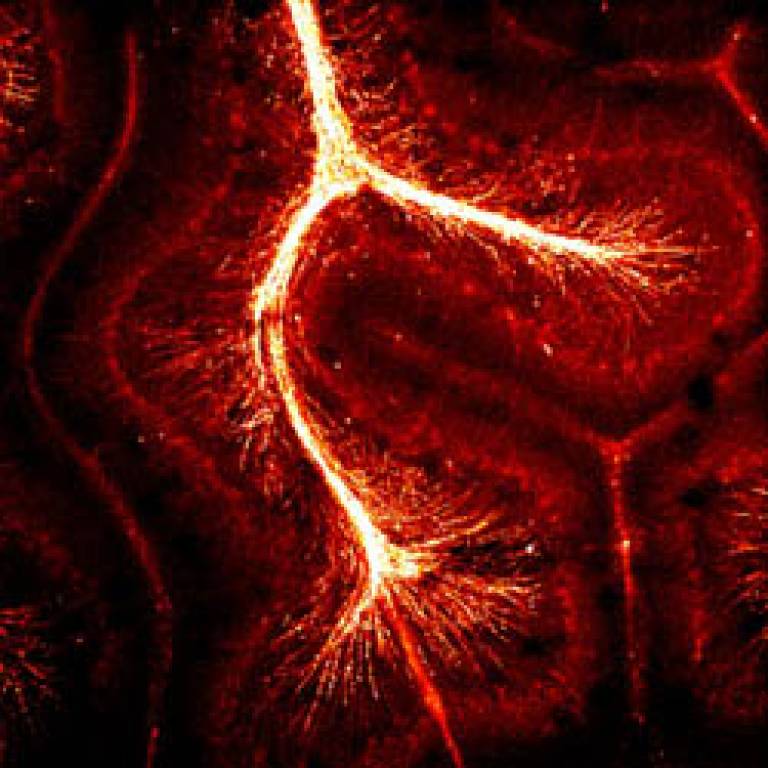Brain Awareness Week at UCL
14 March 2011
Links
 ucl.ac.uk/neuroscience" target="_self">UCL
Neuroscience
ucl.ac.uk/neuroscience" target="_self">UCL
Neuroscience
Brain Awareness Week, running 14-20 March, is an annual international campaign designed to increase public awareness about the progress and benefits of brain research.
Each day throughout the week on the UCL
Neuroscience news page, a different UCL Neuroscience researcher will describe
what it's like to be a neuroscientist, and the challenges and highlights of
their careers:
- Monday 14: Dr Jonathan Roiser - UCL Institute of Cognitive Neuroscience
- Tuesday 15: Julie Moonga - PhD student, UCL Institute of Neurology
- Wednesday 16: Professor Matteo Carandini - UCL Institute of Ophthalmology
- Thursday 17: Dr Olga Ciccarelli - UCL Institute of Neurology and National Hospital for Neurology and Neurosurgery
- Friday 18: Dr Josef Kittler - UCL Neuroscience, Physiology and Pharmacology
UCL Neuroscience seeks to make fundamental discoveries about brain function and behaviour, to teach and train the next generation of scientists and clinicians, and to transform our ability to diagnose and treat neurological and psychiatric disease. In the slideshow of images below, UCL neuroscientists expose and explore the beauty of the brain, the most intricate organ in the human body.
Click on the player below to view the slideshow of neuroscience images from the UCL community
UCL neuroscientists are also involved a range of events throughout the week.
- Beatboxing on the Brain: 14 March, 7:00pm, The Betsey Trotwood Pub, 56 Farringdon Road
'Beatboxing on the Brain' is the result of a
collaboration between UCL neuroscientist Dr Carolyn McGettigan and the UK's
champion beatboxer, Reeps One. Come along to hear about the evolution of the
voice, the structure of sounds, the art of beatboxing, and literally take a
peek inside Reeps' head as we present the results of our MRI study.
Free and
open to all, but registration is required.
- Should the brain be left to neuroscientists?: 15 March, 1:15pm, Darwin Lecture Theatre, Darwin Building, UCL
A Lunch Hour
Lecture given by Dr Daniel Glaser, UCL Psychology. Free and
open to anyone on a first-come first-served basis. Lectures are also streamed
live online or can be downloaded after the event. For more details, see the Lunch Hour Lecture page.
- The deaf and signing brain: 16 March, 6:30pm, Friends Meeting House, Euston Road
Healthy Deaf Minds special lecture presented
by UCL's Mairead MacSweeney in association with the Deafness, Cognition and Language Research Centre at UCL. The event is free and open to all.
- Science vs Politics in Drug Policy: 18 March, 2:00pm, 33 Queen Square Lecture Theatre
Guest
lecture at the UCL Institute of Neurology presented by Professor David Nutt (Imperial College, President Elect,
British Neuroscience Association).
UCL context
UCL is one of the world's leading research institutions
for neuroscience. Across more than 450 research groups we address fundamental
questions about brain function and behaviour across the lifespan, in health and
disease.
The UCL Neuroscience Domain is a strategic initiative that unites the collective activities of these groups from across the university. It seeks to: enable world-class research by bringing together researchers from across disciplines; provide the optimal training environment to produce future generations of neuroscientists; and promote greater engagement between scientists and society.
Related news
Rhythm and the perception of time
Understanding how the brain determines coincidence
Look at your body to reduce pain
Watch: The neuroscience of laughter
Image: The gold colour shows information superhighways in the brain: the gold is a protein making up myelin, which speeds the conduction of electrical signals along nerve cells, allowing us to think more quickly. Courtesy of Professor David Attwell (UCL Neuroscience, Physiology & Pharmacology)
 Close
Close

